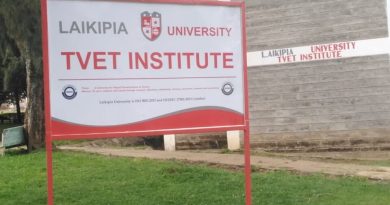Master of Science In Telecommunication Engineering At Dedan Kimathi University Of Technology
A Master of Science (M.S.) in Telecommunication Engineering at Telecommunication Engineering At Dedan Kimathi University Of Technology is a postgraduate degree program that focuses on the design, development, implementation, and management of telecommunication systems and networks. It equips students with advanced knowledge and skills in the field of telecommunications, preparing them for careers in industries such as telecommunications, networking, wireless communications, and information technology.
The M.S. program in Telecommunication Engineering builds upon the foundations of undergraduate studies in electrical engineering, computer engineering, or a related field. It offers specialized coursework and practical training to deepen students’ understanding of telecommunications concepts, technologies, protocols, and systems.
Qualifications to study Master of Science in Telecommunication Engineering Program at Dedan Kimathi University
The following shall be eligible for registration for the Master of Science in Telecommunication Engineering:
Either;
- A holder of at least an Upper Second Class Honours Bachelor’s degree from DeKUT in Electrical and Electronic Engineering.
- A holder of a Bachelor of Science in Electrical & Electronic Engineering degree of at least Second Class Honours (Upper Division) from an other institution recognized by the DeKUT Senate.
- A holder of a Second Class Honours (Lower Division), Bachelor of Science in Electrical & Electronic Engineering degree from DeKUT or any other institution recognized by the University Senate as being of equivalent academic status and who in addition must show proof ofany other institution recognized by the University Senate as being of equivalent academic status and who in addition must show proof ofeither two years of relevant experience and professional development or in lieu of such experience, academic advancement through researchand publication since graduation with the bachelor’s degree or a postgraduate diploma in the relevant field.
- A holder of any other qualifications recognized by the Senate as equivalent to the above.
Admission requirements for M.S. programs in Telecommunication Engineering can vary among institutions, but they generally include a bachelor’s degree in a relevant field, letters of recommendation, a statement of purpose, and satisfactory performance on standardized tests such as the GRE (Graduate Record Examination). Some universities may also consider relevant work experience or research background during the selection process.
The curriculum of an M.S. program in Telecommunication Engineering typically covers a wide range of topics related to telecommunications. Students undertake advanced coursework that includes subjects such as digital communications, wireless communications, network protocols, telecommunications systems, data transmission, signal processing, network security, and mobile computing. The program may also offer elective courses, allowing students to specialize in areas such as optical communications, satellite communications, internet of things (IoT), or network management.
In addition to coursework, students in the M.S. program may have opportunities for hands-on experience through laboratory work, projects, and internships. These practical components enable students to apply their theoretical knowledge to real-world scenarios, gain practical skills, and develop problem-solving abilities. They may have access to state-of-the-art telecommunication equipment, network simulators, or software tools commonly used in industry.
Another crucial aspect of the M.S. program is research. Students often have the opportunity to undertake research projects under the supervision of faculty members or industry experts. These projects allow students to explore specific areas of interest within telecommunication engineering, contribute to the advancement of knowledge, and address emerging challenges in the field. Research projects may focus on areas such as wireless networks, broadband communications, data analytics, network optimization, or emerging communication technologies.
Throughout the program, students are encouraged to stay updated with the latest developments in telecommunication engineering by attending seminars, workshops, and conferences. They may also have opportunities to collaborate with faculty and peers, which fosters a multidisciplinary approach, facilitates knowledge exchange, and enhances networking within the industry.
The duration of an M.S. program in Telecommunication Engineering typically ranges from one to two years of full-time study. Part-time options may also be available to accommodate the needs of working professionals. The program’s duration depends on various factors, including the university’s requirements, the student’s academic background, and the chosen research or project focus.
Upon completion of the M.S. program, graduates are well-equipped with advanced technical knowledge, critical thinking skills, and practical experience in telecommunication engineering. They can pursue diverse career paths in industries such as telecommunications service providers, networking companies, research and development organizations, or consulting firms. Graduates may work in roles such as telecommunication engineer, network architect, wireless communication specialist, system analyst, or project manager.
Furthermore, M.S. graduates in Telecommunication Engineering can contribute to the design and implementation of advanced telecommunication systems, develop innovative solutions to communication challenges, and lead research and development initiatives in emerging technologies. Some graduates may choose to pursue further academic research or teaching positions by enrolling in Ph.D. programs in Telecommunication Engineering or related fields.
Related
Master of Science in Mechanical Engineering At Dedan Kimathi University Of Technology
Dedan Kimathi University Of Technology PhD Mechanical Engineering Program




